Get the latest financial news, insights and expert analysis from our award-winning MoneyWeek team, to help you understand what really matters when it comes to your finances.
You are now subscribed
Your newsletter sign-up was successful
Want to add more newsletters?

Twice daily
MoneyWeek
Get the latest financial news, insights and expert analysis from our award-winning MoneyWeek team, to help you understand what really matters when it comes to your finances.

Four times a week
Look After My Bills
Sign up to our free money-saving newsletter, filled with the latest news and expert advice to help you find the best tips and deals for managing your bills. Start saving today!
Welcome back.
This week’s magazine has something of a biotech bent. First, on the cover, we have the vaccine patent waiver story – it might sound like a good idea but it’s not going to work, says Simon Wilson, and will have “damaging long-term effects on future innovation”.
And speaking of innovation, Matthew Partridge looks at the work being done on Alzheimer’s disease, a devastating condition that is now one of the top causes of death in the world. Matthew looks at how you can invest in the search for a breakthrough.
MoneyWeek
Subscribe to MoneyWeek today and get your first six magazine issues absolutely FREE

Sign up to Money Morning
Don't miss the latest investment and personal finances news, market analysis, plus money-saving tips with our free twice-daily newsletter
Don't miss the latest investment and personal finances news, market analysis, plus money-saving tips with our free twice-daily newsletter
In the podcast this week, Merryn is joined by John. They have a good old chat about the UK’s V-shaped post-pandemic recovery, as evidenced by a trip to John Lewis; how the UK’s excellent-value listed companies are getting snapped up by private equity firms; and – inevitably this week – the pros and cons of bitcoin. Does it have any value? How would you know? And should you buy it anyway? Listen to their conversation here.
This week’s “Too Embarrassed To Ask” explains what “pound cost averaging” is. It’s one of those complicated-sounding investment terms which describes a very simple process. Find out more here.
Here are the links for this week’s editions of Money Morning and other web stories you may have missed.
- Monday Money Morning: US stocks look expensive – here’s what to own instead
- Tuesday Money Morning: We’re in another house price boom. How long will it last?
- Merryn’s blog: Forget bitcoins, turn to real coins as an inflation hedge
- Web article: Bitcoin plunges after China cracks down on crypto – what does this mean for investors?
- Wednesday Money Morning: Bitcoin is in a bear market. So what should hodlers do now?
- Web article: How are my cryptocurrency gains taxed in the UK?
- Thursday Money Morning: Inflation is here – and shifting politics means it's here to stay
- Web article: “Raise inheritance tax”, says the OECD. Governments won’t need to be told twice
- Friday Money Morning: The biggest long-term threat to bitcoin and cryptocurrencies
- Web article: Provincial house prices continue to soar as London gets left behind
Now for the charts of the week.
The charts that matter
Gold is having a very positive week – with inflation taking hold, perhaps it’s coming back into its own?
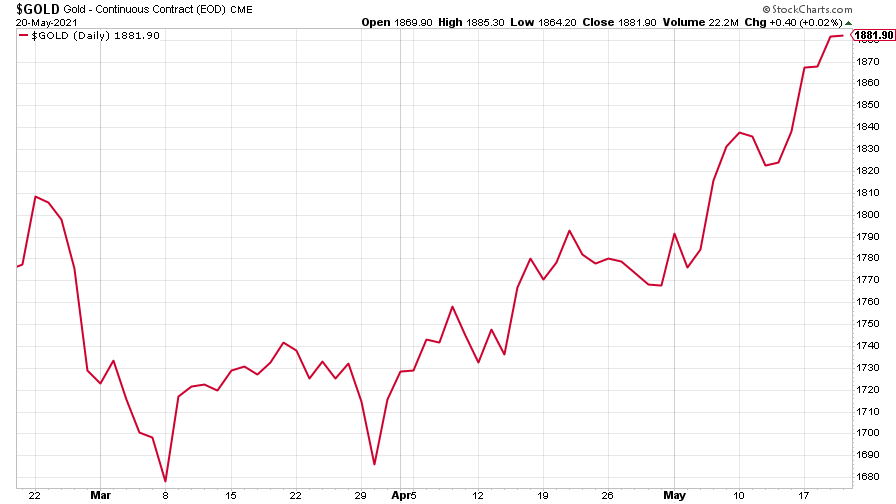
(Gold: three months)
The US dollar index (DXY – a measure of the strength of the dollar against a basket of the currencies of its major trading partners) is continuing in its bear market, sliding further.
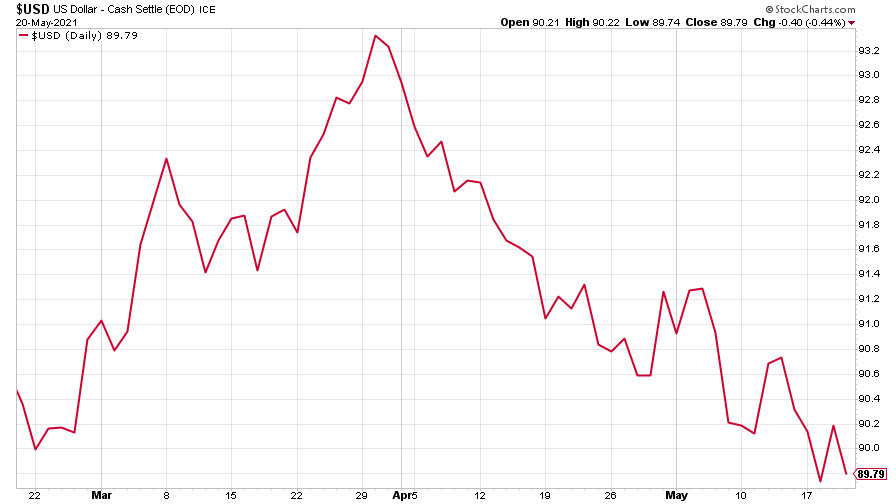
(DXY: three months)
The Chinese yuan (or renminbi) was back on the rise against the not-so-mighty dollar (when the red line is rising, the dollar is strengthening while the yuan is weakening).
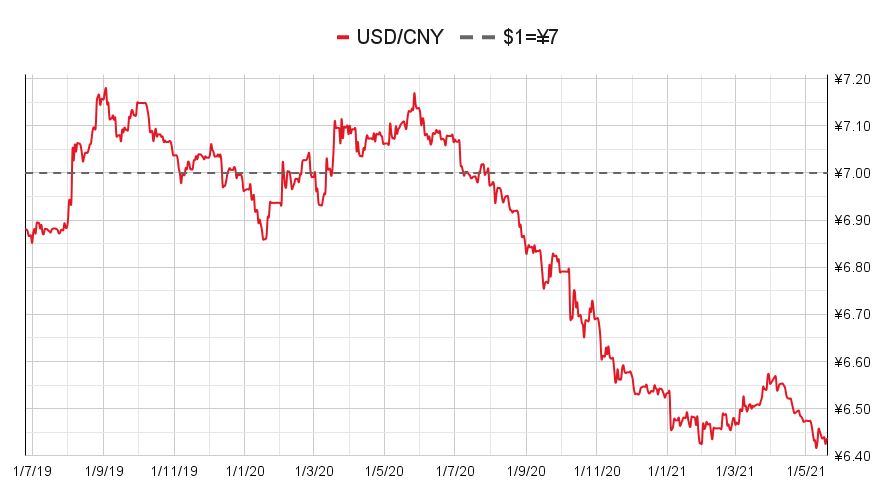
(Chinese yuan to the US dollar: since 25 Jun 2019)
The downward drift in the yield on the ten-year US government bond halted.
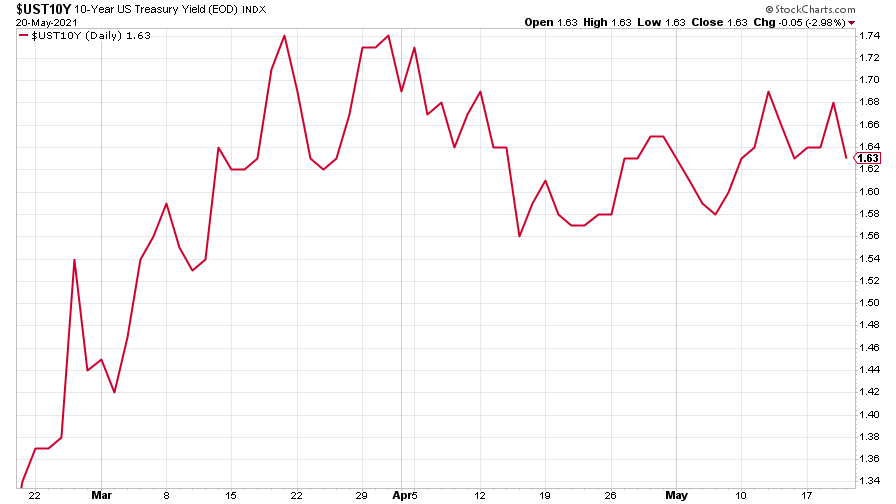
(Ten-year US Treasury yield: three months)
The yield on the Japanese ten-year bond looked to be turning up again.
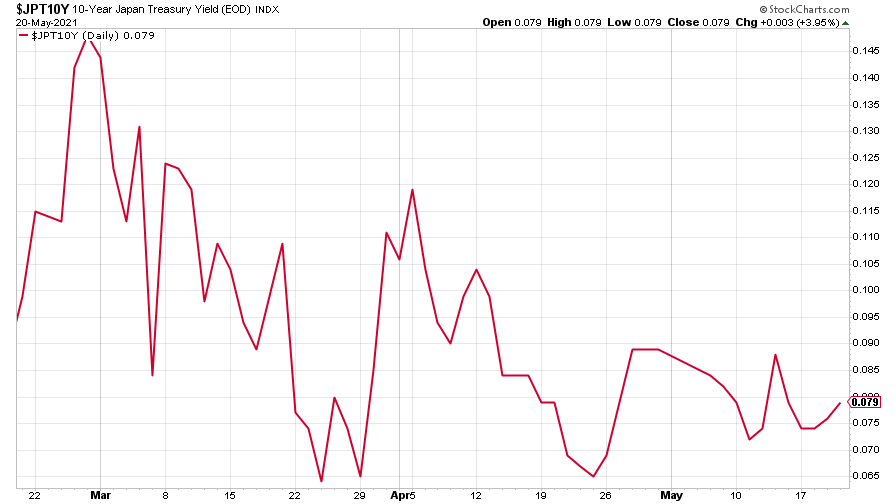
(Ten-year Japanese government bond yield: three months)
And the yield on the ten-year German Bund, got ever closer to positive territory, but remained negative (for now).
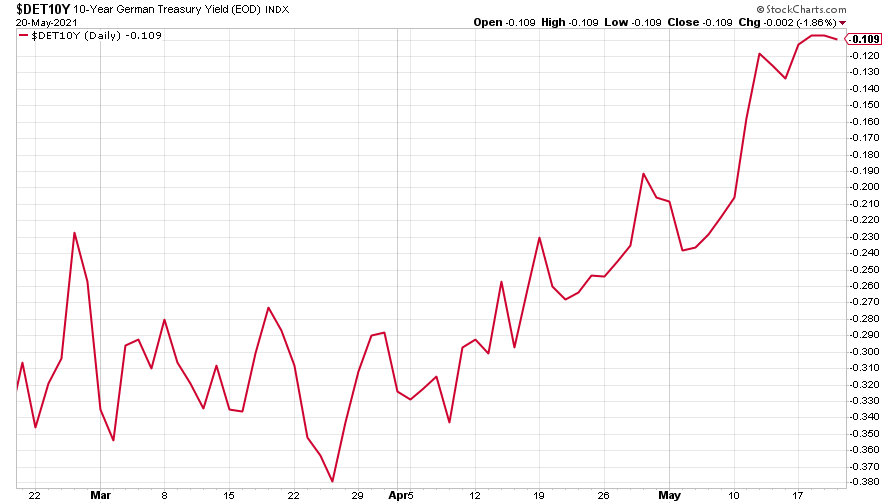
(Ten-year Bund yield: three months)
Copper’s mighty bull run paused for breath. Understandable after making yet another high.
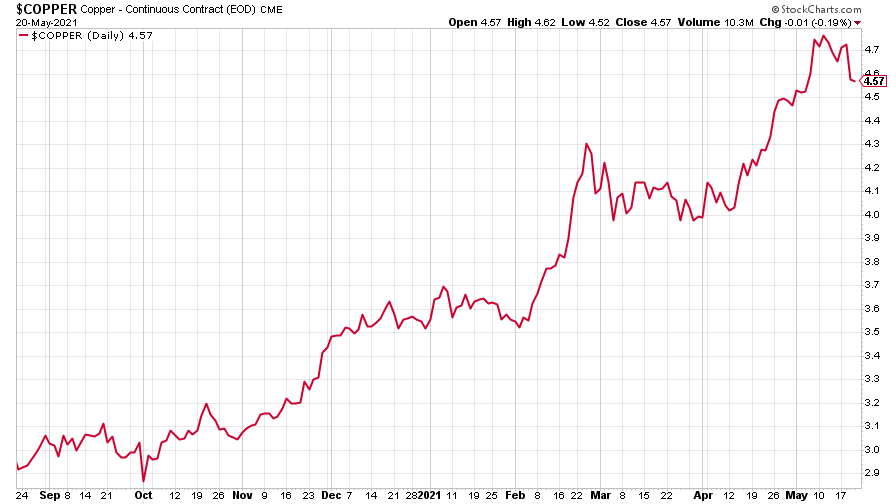
(Copper: nine months)
The closely-related Aussie dollar continued its erratic way in a sideways direction.
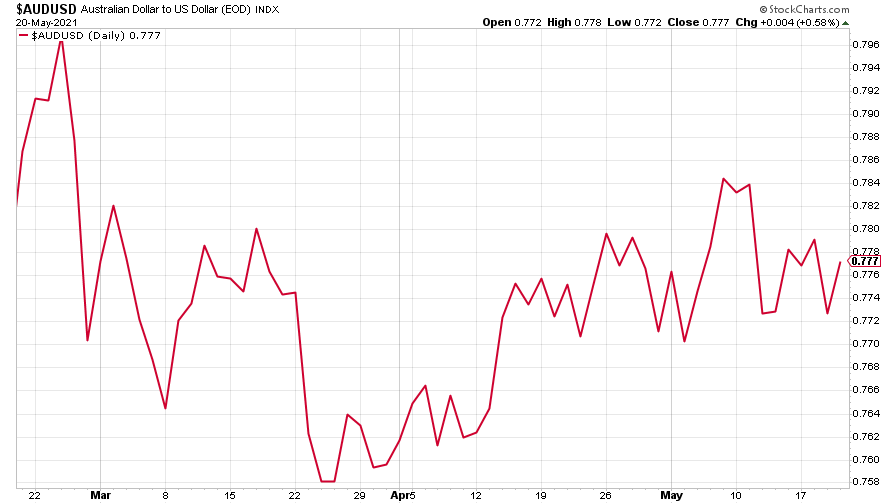
(Aussie dollar vs US dollar exchange rate: three months)
And, of course, the big story of the week – bitcoin lost 30% of its value at one point after China said it would crack down on cryptocurrencies.
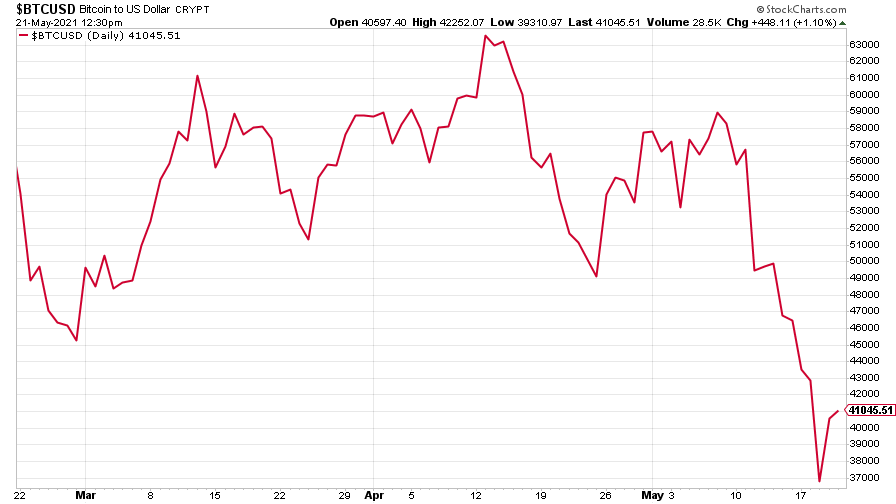
(Bitcoin: three months)
US weekly initial jobless claims were down again, falling 34,000 to 444,000, compared to 478,000 last week (revised up from 473,000). The four-week moving average fell to 504,750, down 30,500 from 535,250 (which was revised up from 534,000) the week before.
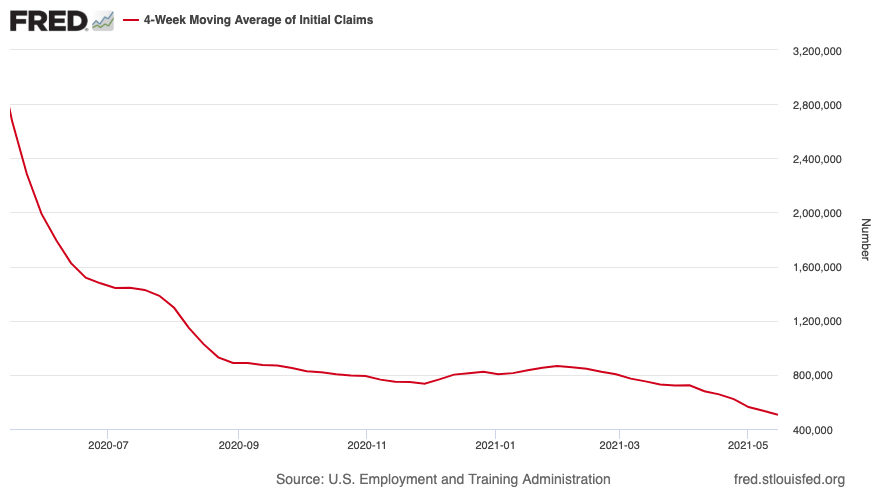
(US initial jobless claims, four-week moving average: since Jan 2020)
The oil price fell hard, too.
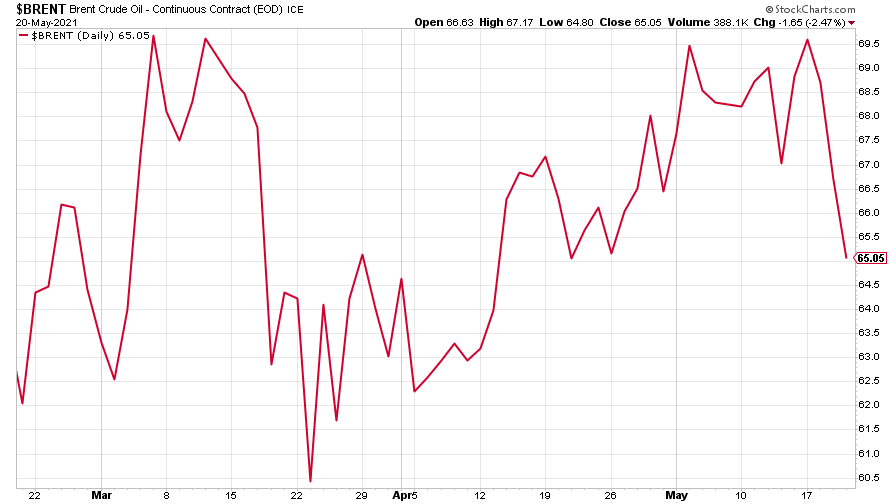
(Brent crude oil: three months)
Amazon seems to be recovering after its post-results selloff.
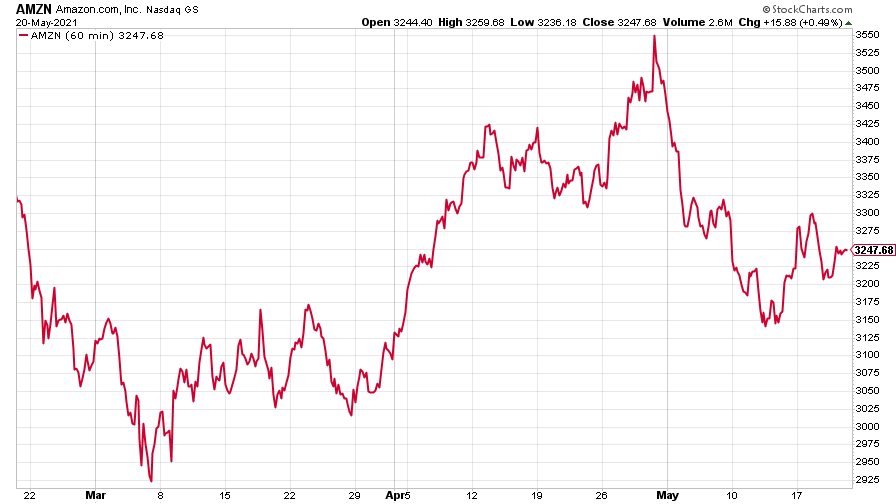
(Amazon: three months)
And Tesla had a terrible week – the electric-car maker seems to be in the sights of some big short sellers. It’s also a tech stock, and one which is closely linked in investors’ minds to bitcoin (that’ll be because Elon Musk won’t stop tweeting about it). So rising inflation fear (which also means the threat of rising rates, which profitless tech stocks don’t like) alongside a bitcoin crash spells a tough environment for Tesla.
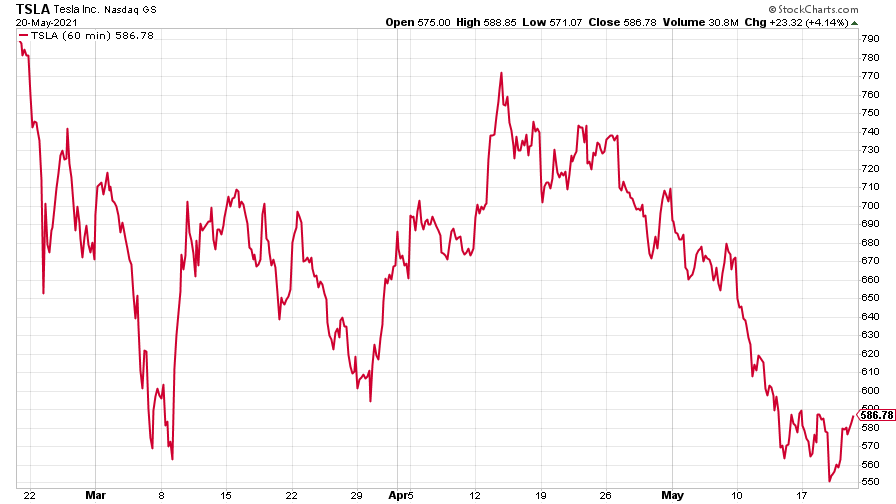
(Tesla: three months)
Have a great weekend.
Get the latest financial news, insights and expert analysis from our award-winning MoneyWeek team, to help you understand what really matters when it comes to your finances.

-
 Should you buy an active ETF?
Should you buy an active ETF?ETFs are often mischaracterised as passive products, but they can be a convenient way to add active management to your portfolio
-
 Power up your pension before 5 April – easy ways to save before the tax year end
Power up your pension before 5 April – easy ways to save before the tax year endWith the end of the tax year looming, pension savers currently have a window to review and maximise what’s going into their retirement funds – we look at how
-
 UK wages grow at a record pace
UK wages grow at a record paceThe latest UK wages data will add pressure on the BoE to push interest rates even higher.
-
 Trapped in a time of zombie government
Trapped in a time of zombie governmentIt’s not just companies that are eking out an existence, says Max King. The state is in the twilight zone too.
-
 America is in deep denial over debt
America is in deep denial over debtThe downgrade in America’s credit rating was much criticised by the US government, says Alex Rankine. But was it a long time coming?
-
 UK economy avoids stagnation with surprise growth
UK economy avoids stagnation with surprise growthGross domestic product increased by 0.2% in the second quarter and by 0.5% in June
-
 Bank of England raises interest rates to 5.25%
Bank of England raises interest rates to 5.25%The Bank has hiked rates from 5% to 5.25%, marking the 14th increase in a row. We explain what it means for savers and homeowners - and whether more rate rises are on the horizon
-
 UK inflation remains at 8.7% ‒ what it means for your money
UK inflation remains at 8.7% ‒ what it means for your moneyInflation was unmoved at 8.7% in the 12 months to May. What does this ‘sticky’ rate of inflation mean for your money?
-
 Would a food price cap actually work?
Would a food price cap actually work?Analysis The government is discussing plans to cap the prices of essentials. But could this intervention do more harm than good?
-
 Is my pay keeping up with inflation?
Is my pay keeping up with inflation?Analysis High inflation means take home pay is being eroded in real terms. An online calculator reveals the pay rise you need to match the rising cost of living - and how much worse off you are without it.
